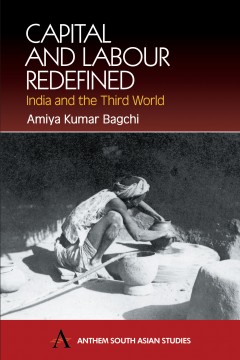Capital and Labour Redefined
India and the Third World
By Amiya Kumar Bagchi
Anthem Frontiers of Global Political Economy and Development
Other Formats Available:
- About This Book
- Reviews
- Author Information
- Series
- Table of Contents
- Links
- Podcasts
About This Book
This book provides a historical background to the formation of the Indian capitalist class from before British colonial rule in India. It analyses the nature of that class, the ways in which it changed under colonial rule, and the state of independent India; it also sets some of the peculiarities of capitalist organization in India and the ideology of big capital in their historical context.
The evolution of the working class in India is analysed in its dialectical interaction with global capital and Indian capitalism. The author challenges the view that the tensions within working class movements caused by caste, communal divisions or gender discrimination are to be attributed to primordial loyalties, emphasizing instead the influence of the deliberate strategies adopted by capitalists and of changes in the structure of global and Indian capitalism. Finally, the book investigates the impact of capital-friendly liberalization on the fortunes of the working class in the Third World.
Reviews
Author Information
Amiya Kumar Bagchi is the RBI Professor of Economics at the Centre for Studies in Social Sciences in Calcutta.
Series
Anthem South Asian Studies
Anthem Frontiers of Global Political Economy and Development
Table of Contents
Acknowledgement; Capital and Labour at the Dawn of the Twenty-first Century; The Economics of Business and the Business of Economics; Merchants and Colonialism; Reflections on the Nature of the Indian Bourgeoisie; Colonialism and the Nature of 'Capitalist' Enterprise in India; The Ambiguity of Progress: Indian Society in Transition; Wealtha nd Work in Calcutta: 1860-1921; Working-Class Consciousness; Dualism and Dialectics in the Historiography of Labour; Neo-liberal Economic Reforms and Workers of the Thrid World: At the End of the Second Millennium of the Christian Era; Predatory Commercialization and Communalism in India; Multiculturalism, Governance and the Indian Bourgeoisie; Index
Links
Stay Updated
Information
Latest Tweets



